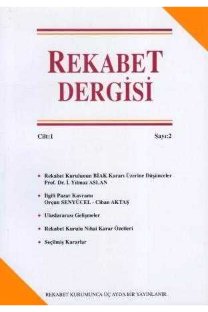Liberalization of the Turkish natural gas market
Doğal gaz endüstrisi dinamik, karmaşık ve günümüz zaman diliminde gösterdiği önemli değişim nedeniyle gözlemlenmesi heyecan verici olan bir endüstridir. Doğal gaz endüstrisi, aramadan üretime, pazarlamadan ticarete, iletimden tüketime her alanda hız kaybetmeden büyümekte ve dünya çapında milyonlarca kişiye istihdam imkânı yaratmaktadır. Endüstriyelleşmiş ülkeler yanında Türkiye gibi ekonomisi ve dolayısıyla enerji tüketimi her geçen yıl artan ülkeler, doğal gaz aramayı ve en geniş biçimde iletim ağlarının kurulmasını teşvik ederek birincil enerji tüketim kompozisyonlarını, farklılaştırmaktadır. Bu bağlamda doğal gaz, son yıllarda birincil enerji tüketimi içerisindeki payı en hızlı artan enerji kaynağı olmuştur. Yurtiçi doğal gaz üretiminin, Türkiye 'nin ulusal tüketimin %3 'ünden daha azını karşıladığı bir ortamda ulusal tüketim, 1987 yılındaki yarım milyar metreküplük tüketimden 2008 yılında otuz yedi milyar metreküp seviyesine çıkmıştır. 2008 yılında yaşanan ekonomik krizin etkilerinin hafiflemesinden sonra, tüketim miktarının daha da artması beklenmektedir. Türkiye doğal gaz ihtiyacının büyük bir kısmını Rusya Federasyonundan, kalan kısmını ise Azerbaycan, Cezayir, Nijerya ve İran 'dan karşılamaktadır. Konumu itibariyle oldukça elverişli bir durumda bulunan Türkiye'nin, doğal gaz piyasasını serbestleştirmesinin altında yatan neden, sadece Avrupa Birliği'ne katılım süreci değil aynı zamanda bu elverişli pozisyondan mümkün olduğunca yararlanmaktır.
Türk doğal gaz piyasasının serbestleştirilmesi
The natural gas industry is a dynamic, complex, and exiting place to observe at the current time. Employing millions of people across the globe, the market continues to grow due to ever-increasing opportunities from explorations and production, to marketing and trading, to transportation and consumption. Many emerging countries, including Turkey and even more industrialized nations have been diversifying their primary energy consumption by encouraging the exploration for natural gas and the development of transmission systems to distribute natural gas throughout their countries for its many uses. In this context, natural gas consumption has become the fastest growing primary energy source in Turkey. Domestic gas production in only Turkey meets less than 3% of the domestic demand. Natural gas consumption levels in Turkey have witnessed a dramatic increase, from 0.5 billion cubic meters (bcm) in 1987 to 37 bcm in 2008. Turkish natural gas demand is projected to increase once the languished momentum of growth comes back after recovering from the economic crisis happened in 2008. Turkey has supplied its main natural gas need from Russian Federation, Azerbaijan, Iran, Nigeria and Algeria. Turkey is in a strategically advantageous position in terms of its natural gas market. It can import gas from a number of countries and diversify its sources. Thus, Turkey’s motivation to liberalize its energy markets stems not only from fulfilling the European Union (EU) accession prerequisites in the energy sector but also its desire to utilize this advantageous location.
___
- ANDREW, M. (2009), Gas Market & Storage: Prospects for short-term and long-term security of supply, POYRY Consulting, Prague.
- BALAT, M. (2008), "Energy consumption and economic growth in Turkey during the past two decades", Energy Policy 36, p. 118-127.
- BP (2004), Statistical Review of World Energy, http://www.bp.com. Date Accessed: 09.11.2009.
- CAMERON, D.C. (2002), Competition in Energy Markets: Law and Regulation in the European Union, Oxford University Press, New York, USA.
- COMMISSION OF THE EUROPEAN COMMUNITIES (2001), 2001 Regular Report on Turkey's Progress Towards Accession, SEC 1756, Brussels.
- CRETI, A. and B. VILLENEUVE (2003), Long-term contracts and take-or-pay clauses in natural gas markets, University of Toulouse, France, http://www2.toulouse.inra.fr/lerna/cahiers2003/0310116.pdf, Date Accessed: 21.12.2009.
- DUZYOL, S. (2007), "Gas Market Developments In Turkey", Black Sea Oil And Gas Summit, Turkey, http://www.authorstream.com/presentation/Arkwright26-30Q91-Black-Sea-Summit-05-09-07-GAS-MARKET-DEVELQPMENTS-TURKEY-Strategic-Objective-Turkevs-Natural-Law-No-4646-Wha-blackseasummit-as-Entertainment-ppt-powerpoint/, Date Accessed: 05.05.2009.
- EDIGER, V.S. and S. AKAR (2007), "ARIMA forecasting of primary energy demand by fuel in Turkey", Energy Policy 35, p. 1701-1708.
- EFET (2003,), Implementation of Gas Release Programmes for European Gas Market Development, Holland, http://www.efet.org/Download.asp?File=943, Date Accessed: 23.11.2009.
- EFET (2009), Unbundling as a crucial factor in the completion of European Electricity and Gas Market Liberalization, Holland, www.efet.org/GetFile.aspx?File=:1549, Date Accessed: 23.11.2009.
- FRD (2006), Country Profile: Turkey, Federal Research Division of the Library of Congress, Washington D.C., USA.
- HANDFIELD, R.B. (2004), "The Impact of Energy Deregulation on Sourcing Strategy", The Journal of Supply Chain Management, Vol. 40, p.38-48.
- HIRSCHHAUSEN, V. C. (2008), "Infrastructure, regulation, investment and security of supply: A case study of the restructured US natural gas market", Utulities Policy, Vol. 16, Issue 1.
- HOEKMANN, B. and S. TOGAN (2005), Turkey: Economic Reform and Accession to the European Union, The International Bank for Reconstruction and Development / The World Bank, USA, http://siteresources.worldbank.org/INTRANETTRADE/Resources/Pubs/Turkev BHoekman&STogan book.pdf. Date Accessed: 22.12.2009.
- IEA (1995), The IE A Natural Gas Security Study, IEA/OECD, Paris.
- IEA (2004), Security of Gas Supply in Open Markets, IEA/OECD, Paris.
- IEA (2005), Natural Gas Information 2005, IEA/OECD Paris.
- KILIC, F.C. and D. KAYA (2007), Energy production, consumption, policies, and recent developments in Turkey, Renewable and Sustainable Energy Reviews 11, USA, p.1312-1320.
- MENR (2007), Energy statistics of Turkey, Ankara, Turkey. http://www.enerji.gov.tr/EKLENTI VIEW/index.php/raporlar/raporVeriGir/714 8/2, Date Accessed: 04.09.2009.
- OECD (2002), Regulatory Reform in Electricity, Gas And Road Freight Transport, Reviews of Regulatory Reform, Paris, http://www.oecd.Org/dataoecd/40/l 1/1840779.pdf, Date Accessed: 18.10.2009.
- ŞALVARLI, H. (2006), "Some aspects on hydraulic energy and environment in Turkey", Energy Policy 34, p.3398-3401.
- SOZEN, A. and M. NALBANT (2007), "Situation of Turkey's energy indicators among the EU member states", Energy Policy 35, p.4993-5002.
- TPAO (2008), Petroleum and Natural Gas Industry Report, Ankara, Turkey, http://www.tpao.gov.tr/vl .4/condocs/petrol sektor.pdf. Date Accessed: 04.15.2009.
- WORLD BANK (2007), Turkey: Gas Sector Strategy, ESMAP Technical Paper 114/007, Washington D.C., USA, http://www.esmap.0rg/f1lez/pubs/6192007115243 Turkey Gas Sector Strategy Note Technical English 114-07.pdf, Date Accessed: 21.12.2009.
- VICTOR, D., A. JAFFE and M. HAYES (2006), Natural Gas and Geopolitics: From 1970 to 2040, Cambridge University Press, USA.
- ISSN: 1302-552X
- Yayın Aralığı: Yılda 5 Sayı
- Başlangıç: 2000
- Yayıncı: Rekabet Kurumu
